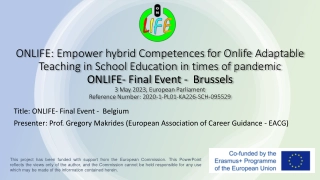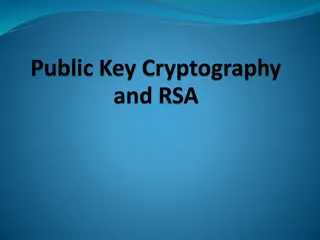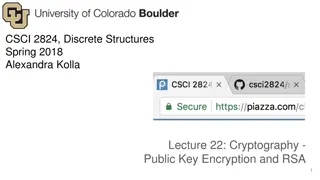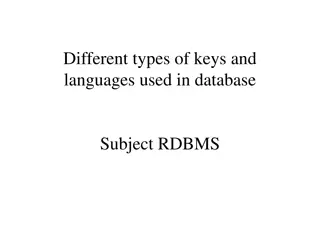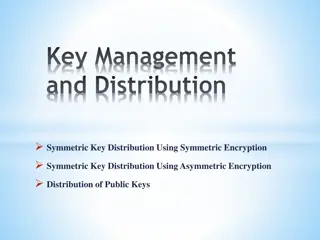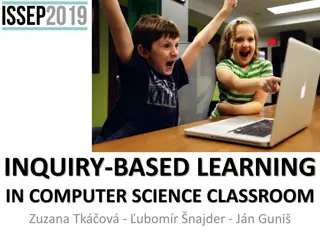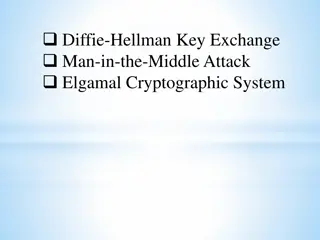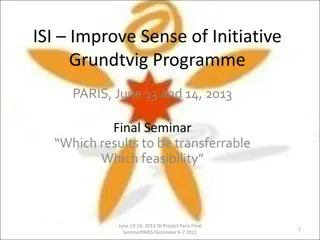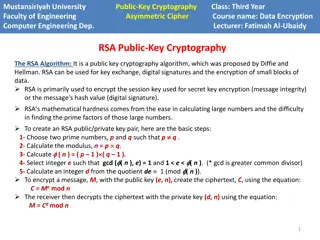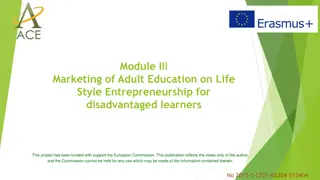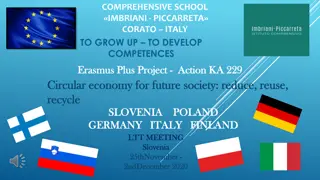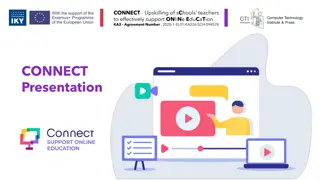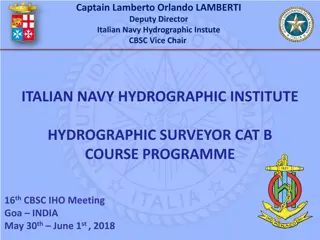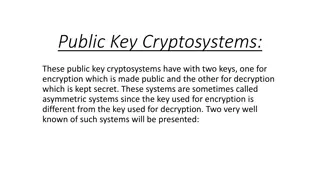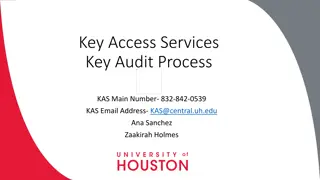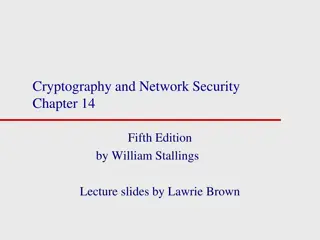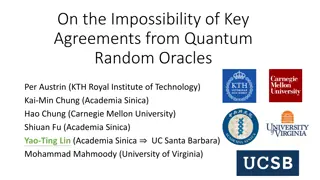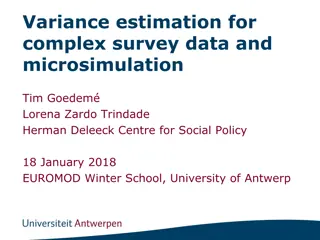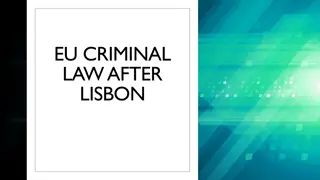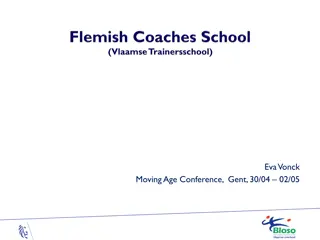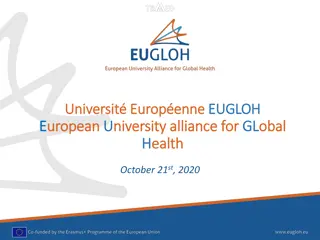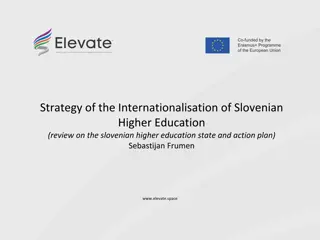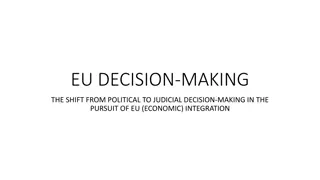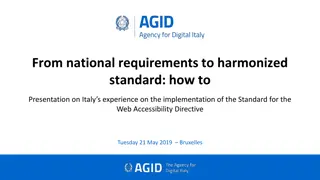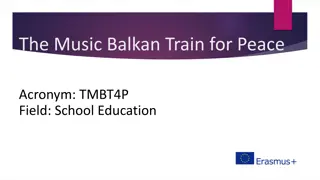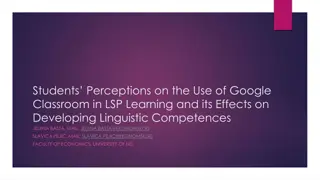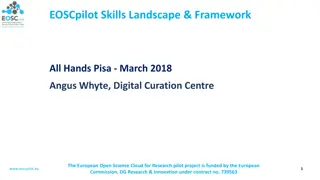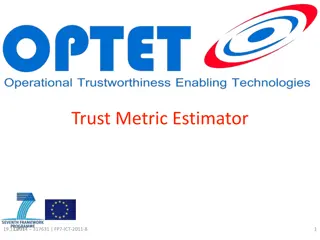Empowering Hybrid Competences for Onlife Teaching in School Education
Join the ONLIFE Final Event in Brussels on May 3, 2023, featuring Prof. Gregory Makrides from the European Association of Career Guidance. Explore how the project aims to enhance teachers' abilities in utilizing digital technologies for online and blended teaching in School Education. Discover the t
0 views • 5 slides
Challenges and Solutions in Implementing Historical Competencies in Teaching
Explore the complexities and obstacles faced in implementing historical competencies in teaching, as discussed by Jens Aage Poulsen, a senior lecturer and researcher at HistoryLab, University College Lillebaelt, Denmark. The content delves into competence-based curriculum, core historical competenci
0 views • 7 slides
Understanding Security Threats and Public-Key Cryptosystems
Explore the world of security threats, passive and active attacks, and the importance of asymmetric encryption through the terminology related to asymmetric encryption, public-key cryptosystems, and public-key cryptography. Learn about the key components of public-key encryption schemes and the proc
0 views • 46 slides
Introduction to RSA Cryptography and Public Key Encryption
Explore the fundamentals of RSA cryptography and public key encryption, including shift ciphers and affine ciphers. Learn how public key encryption solves the challenges of implementing secure communication on a large scale. Discover the key components of RSA, its development history, and the mathem
2 views • 37 slides
Understanding Keys and SQL Commands in Database Management Systems
Explore different types of keys used in databases such as Candidate Key, Super Key, Composite Key, Primary Key, Alternate Key, Unique Key, and Foreign Key. Learn about SQL commands categorized into DDL, DML, and DCL and various query languages like Create, Alter, Rename, Drop, Comment, Truncate, Ins
0 views • 11 slides
Key Management and Distribution Techniques in Cryptography
In the realm of cryptography, effective key management and distribution are crucial for secure data exchange. This involves methods such as symmetric key distribution using symmetric or asymmetric encryption, as well as the distribution of public keys. The process typically includes establishing uni
1 views • 27 slides
Innovative Learning Project to Raise Awareness on Plastics Consumption
Innovative project funded by the Erasmus+ program aims to enhance students' competences and citizenship in relation to plastics consumption. Key objectives include implementing art-based and service learning methodologies, supporting teachers in developing innovative teaching methods, and fostering
2 views • 42 slides
Introduction to Public Key Cryptography
Public key cryptography, exemplified by algorithms like Diffie-Hellman and RSA, revolutionizes secure communication by allowing users to encrypt messages with public keys known to all and decrypt them with private keys known only to the intended recipient. This advanced encryption method ensures sec
1 views • 44 slides
ASEM Education Strategy 2030 Overview
The ASEM Education Strategy 2030 aims to establish a common vision for Asia-Europe collaboration in education. This strategy emphasizes inclusive and equitable quality education through partnerships and exchanges. The framework includes four strategic objectives focusing on enhancing connectivity, p
0 views • 10 slides
**Exploring Inquiry-Based Learning in Computer Science Education**
Inquiry-based learning (IBL) in computer science classrooms focuses on fostering communication, collaboration, decision-making, and problem-solving skills among students. The approach involves students constructing knowledge through independent, active activities based on real-world experiences. How
0 views • 18 slides
Understanding Diffie-Hellman Key Exchange Algorithm
The Diffie-Hellman key exchange algorithm, a pioneering public-key cryptography method introduced by Diffie and Hellman in 1976, enables secure key exchange between two users to facilitate subsequent message encryption. The algorithm relies on the complexity of computing discrete logarithms and invo
0 views • 24 slides
Enhancing Sense of Initiative and Key Competences in Vocational Training
Explore the journey of the ISI Project in improving sense of initiative and key competences through seminars and workshops in various cities like Paris, Florence, and Bordeaux. Learn about innovative teaching methods, vocational training paths, evaluation criteria, and more discussed during the proj
1 views • 11 slides
RSA Algorithm in Public-Key Cryptography
The RSA algorithm is a crucial public key cryptography method used for key exchange, digital signatures, and data encryption. It involves generating public-private key pairs using prime numbers, encryption with the public key, and decryption with the private key. The algorithm's strength lies in the
0 views • 5 slides
Understanding Public-Key Cryptography and Its Applications
Public-Key Cryptography revolutionized secure communication by introducing the concept of using separate keys for encryption and decryption. Initially explored by researchers like Diffie, Hellman, and Merkle in the 70s, it addressed key distribution challenges faced by symmetric cryptography. This m
0 views • 34 slides
Transforming Finnish Education: Insights from CEO Ari Pokka
Embracing a visionary mindset, Finnish Education Institute's CEO, Ari Pokka, compares a principal to a bandleader of a jazz band, highlighting the importance of bringing forth fundamental themes. The narrative delves into crucial aspects such as student stories, challenges to overcome, Finnish respo
1 views • 10 slides
Understanding Methodological Choice and Key Categories Analysis in Greenhouse Gas Inventory Management
Methodological choice and key categories analysis play a crucial role in managing uncertainties in greenhouse gas inventories. By prioritizing key categories and applying rigorous methods where necessary, countries can improve the accuracy and reliability of their emissions estimates. Key categories
0 views • 24 slides
Marketing Strategies for Adult Education in Entrepreneurship
This project focuses on developing marketing competences for adult educators to engage disadvantaged learners in lifelong learning and entrepreneurship training. The aim is to empower learners through effective marketing strategies and communication channels, highlighting the social and psychologica
0 views • 39 slides
Exploring the Comprehensive School Imbriani-Piccarreta in Corato, Italy
Welcome to M.R. Imbriani school in Corato, Italy, a state secondary school serving a diverse community. Learn about the school's mission to develop competences through the Erasmus Plus Project, promoting circular economy for a sustainable future society. Discover the school's rich history, academic
0 views • 24 slides
CONNECT: Upskilling of Schools Teachers for Online Education Support
This project, funded under Erasmus+ 2020, focuses on enhancing the digital pedagogical competences of teachers to effectively deliver online courses, especially post-COVID-19. The initiative aims to equip teachers with the necessary skills to incorporate digital technology into subject-specific teac
0 views • 9 slides
Italian Navy Hydrographic Institute - Category B Course Programme
Italian Navy Hydrographic Institute offers a Category B Course Programme for Hydrographic Surveyors, providing the necessary knowledge and skills for tasks aboard survey vessels. The program includes theory classes and practice sessions over 8 months, certified by the International Bureau of Standar
0 views • 22 slides
Understanding Public Key Cryptosystems in RSA Encryption
Public key cryptosystems, like RSA, use two keys for encryption and decryption, with one key made public and the other kept secret. This asymmetric system allows secure communication, where the encryption key (E) is used to encrypt messages into ciphertext (C), which can only be decrypted back to th
0 views • 11 slides
Key Access Services Audit Process Overview
This document provides a detailed guide on the Key Access Services Audit Process, including key steps for certifying signatories, assigning Key Auditors, and completing Key Audits. It covers processes for assigning auditors to departments, completing audits, and verifying audit results. Instructions
1 views • 14 slides
Key Distribution and Management in Cryptography
This presentation discusses key distribution and management in cryptography, covering symmetric and asymmetric key cryptography, methods for sharing symmetric and public keys, as well as key distribution techniques such as manual delivery, initial key distributions, and the use of trusted third part
0 views • 30 slides
Quantum Key Agreements and Random Oracles
This academic paper explores the impossibility of achieving key agreements using quantum random oracles, discussing the challenges and limitations in quantum communication, cryptographic protocols, quantum computation, and classical communication. The study delves into the implications of quantum ra
0 views • 29 slides
Variance Estimation for Complex Survey Data and Microsimulation
Variance estimation is crucial for evidence-based policy-making. This workshop, held at the EUROMOD Winter School, focused on the importance of estimating precision in statistics. Key messages include reporting standard errors, confidence intervals, and p-values based on sample estimates, and emphas
0 views • 13 slides
Overview of EU Criminal Law Changes After Lisbon Treaty
The Lisbon Treaty signed in 2007 brought significant changes to EU criminal law, moving cooperation from the EU Treaty to the Treaty on the Functioning of the EU. It abolished the pillar structure, expanded the CJEU's competences in criminal law, and emphasized the area of freedom, security, and jus
0 views • 28 slides
European Social Policies and EU Limits: A Comprehensive Overview
EU social policies are guided by the principle of subsidiarity, ensuring decisions are made close to the citizens. The EU's role is to set framework conditions and compensatory programs, while social policy largely remains the responsibility of individual member states. The Union can act in a policy
0 views • 16 slides
Institutional Framework and Antitrust Law in the EU
The European Union's institutional framework is defined by the Treaties of Lisbon, European Union, and Functioning of European Union. These treaties establish the EU's objectives, governance principles, and delineate competences. Additionally, EU antitrust law principles are based on the Treaties of
0 views • 16 slides
21st Century Labour Market Competences Workshop Insights
Explore the importance of skills in the 21st-century labor market, focusing on research on desirable skills and educational methods. Delve into discussions on future workforce education, school systems, soft skills, and desired employee competences. Discover key skills sought by employers and the si
0 views • 7 slides
MovingAge Conference: Empowering Coaches for Active Aging
Explore the comprehensive program at the MovingAge Conference in Ghent, focusing on educating volunteers and specific initiators for coaching older individuals in physical activity. Gain insights into competences research, development of new movement-oriented courses, and participation in expert gro
0 views • 13 slides
European University Alliance for Global Health - EUGLOH Overview
The European University Alliance for Global Health (EUGLOH) is a pioneering initiative aiming to enhance European university experiences, elevate teaching competences, and drive innovation in the field of Global Health. Through a structured model and robust governance framework, EUGLOH integrates va
0 views • 10 slides
Internationalisation of Slovenian Higher Education: State and Action Plan Review
The internationalisation of Slovenian higher education is vital for establishing global relationships. The state aims for sustainable partnerships, preservation of language, integrated policy, and national identity. Initiatives include resolution on national higher education program, strategy for in
0 views • 12 slides
The Evolution of Decision-Making and Sovereignty in the EU Integration
The shift from political to judicial decision-making in the pursuit of EU economic integration has raised questions about sovereignty within the EU framework. Key topics include the division of competences outlined in the treaties, the rise of the judicial sovereign, expansion of EU sovereign throug
0 views • 7 slides
Italy's Experience with Web Accessibility Directive Implementation
The Agency for Digital Italy (AgID) plays a pivotal role in promoting digital literacy and coordinating ICT initiatives for public administrations in Italy. Through its broad competences in e-Government and technology innovation, AgID ensures the quality and efficiency of ICT systems, adhering to na
0 views • 10 slides
The Music Balkan Train for Peace - School Education Project
The Music Balkan Train for Peace (TMBT4P) project aims to enhance teaching practices by bringing together teachers from different regions to collaborate on implementing new strategies and educational methodologies. The project focuses on the development of key competences, supporting teachers and sc
0 views • 15 slides
Key Exchange and Public-Key Cryptography Overview
Explore the challenges of key management, the use of trusted third parties in generating shared keys, the limitations of toy protocols in secure key exchange, and the evolution of public-key cryptography techniques like Merkle Puzzles, Diffie-Hellman, and RSA. Learn how to achieve secure key exchang
0 views • 36 slides
Challenges and Solutions in Modern Higher Education Systems
Universities play a vital role in society by preparing students for citizenship and careers, maintaining knowledge bases, and fostering research. However, current challenges include massification of education, focus on employability over critical thinking, financial pressures on students, and the qu
0 views • 6 slides
Exploring Students' Perceptions of Google Classroom in LSP Learning
The study delves into how students at the Faculty of Economics, University of Ni perceive Google Classroom for LSP learning, examining ease of use, usefulness, and impact on linguistic competences. Google Classroom's features, benefits, and challenges in enhancing digital learning are discussed with
0 views • 25 slides
Understanding Competences, Skills, and Stewardship in Research for the European Open Science Cloud
The European Open Science Cloud pilot project aims to link competences, skills, and capabilities for stewardship in research. It explores the connection between competences, capabilities needed by research teams for the EOSC environment, and skills required for open data science. The importance of s
0 views • 19 slides
Trust Metric Estimator: Computational Model for Trustworthiness Assessment
The Trust Metric Estimator project aims to create a computational model to estimate user trust levels towards system performance over time. It considers social and technical factors, integrating trust, trustworthiness, and economic aspects to aid decision-making. Research includes surveys to identif
2 views • 8 slides
